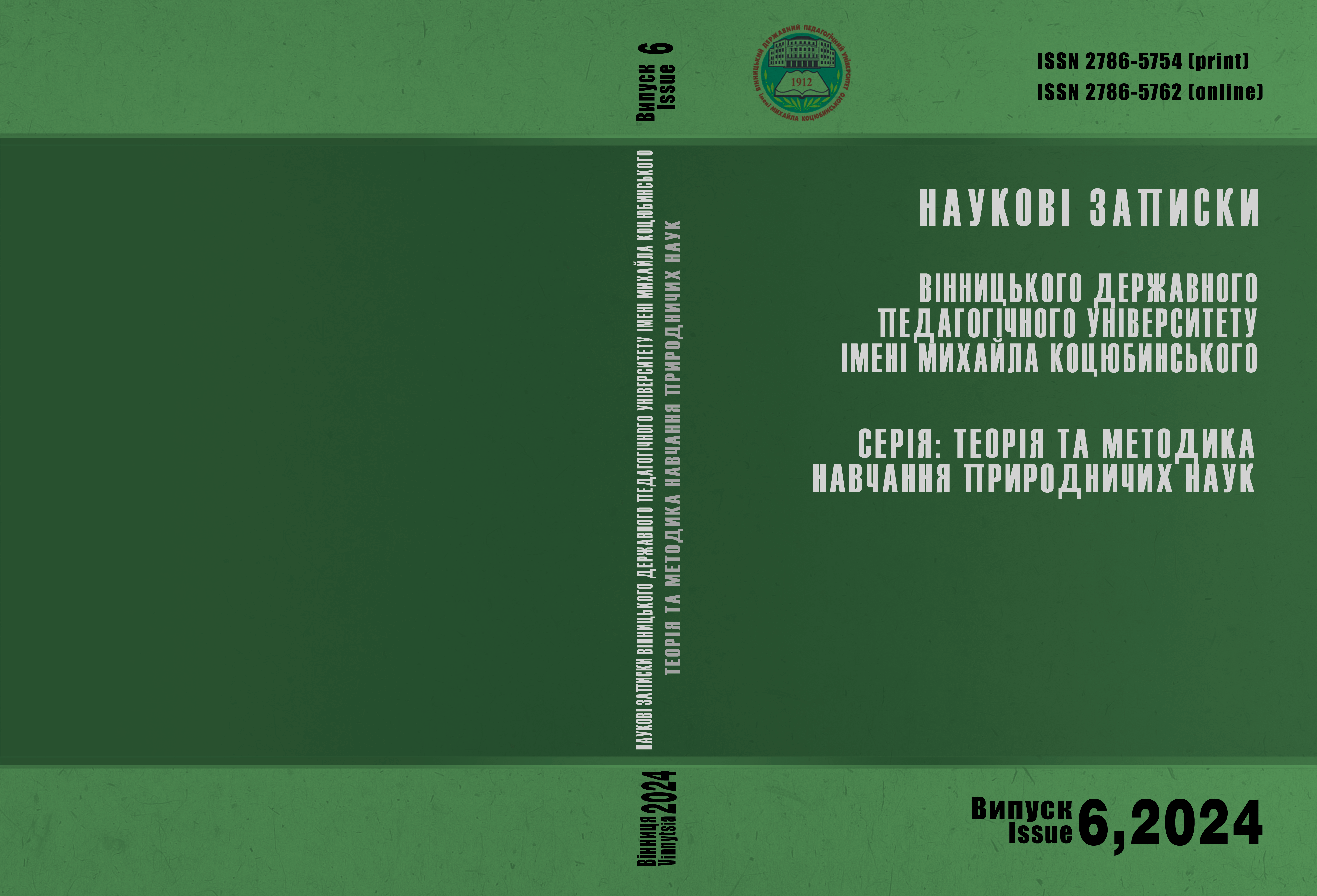Abstract
The realities of school practice put forward new requirements for the quality of methodical training of future teachers of biology and the basics of health. A combination of various forms of organization of the educational process, transitional stage of implementation of model training programs, completion of studies according to the State Standard of basic and full general secondary education are the main ones. Updating the content of methodical training, its structuring and design are the important conditions for ensuring high quality.
This study aimed to investigate the features of structuring the content of methodical training of future teachers of biology and the basics of health in the conditions of blended learning. Research methods were used: a comprehensive analysis of scientific and methodological sources, an analysis of the school practice of teaching biology and the practice of training future teachers of biology and the basics of health in higher education institutions, synthesis, comparison, abstraction. This structuring is based on the select of the leading didactic unit – the lesson. Analysis of the experience of training future teachers makes it possible to state that the use of blended learning technologies is developing both in the process of professional and methodical training. The main task of the teacher in blended learning is methodical design of the educational component as a result of action and experience gained during its mastery.
The select of didactic units of content structuring and further design of the methodical training process are the basic theoretical basis for the development of a modern system of methodical training of future teachers of biology and the basics of health. Methodical skills in designing and conducting lessons are main skills of a teacher. In our opinion, the leading didactic unit of structuring is the lesson as the main form of teaching biology. The peculiarities of structuring the content of laboratory classes on the methodology of teaching biology and human health in the conditions of blended learning were described.
References
Атаманчук М. Біологія 7 клас. Рептилії. https://www.youtube.com/watch?v=9M57ernuUa4
Балан П. Г., Котик Т. С. Біологія 6 клас. Зошит для практичних робіт, лабораторних досліджень і дослідницького практикуму (з інструкціями щодо виконання практичних дій на уроці та в позаурочний час). Київ : Генеза, 2015. 56с. https://www.geneza.ua/product/355
Біологія 6-9 класи. Навчальна програма для загальноосвітніх навчальних закладів. http://surl.li/euwf
Гусак П. М. Технологія засвоєння студентами дидактичної теорії. Луцьк : Вид-во ВДУ, 1996. 115 с.
Державний стандарт базової і повної загальної середньої освіти (затверджено постановою Кабінету Міністрів України від 23.11.2011 р. № 1392). http://zakon3.rada.gov.ua/laws/show/1392-2011-%D0%BF
Загальна методика навчання біології: навч. посіб./ за ред. І.В. Мороза. Київ: Либідь, 2006. 592 с.
Задорожна О. Практична робота №2 Виготовлення мікропрепаратів шкірки луски цибулі. https://www.youtube.com/watch?v=6IR9QxasIG8
Застосування сторітелінгу як чинника формування ключових компетентностей учнів на уроках біології. Майстер-клас. https://youtu.be/4fgpO0W03uA (дата звернення: 23.03.2024).
Календарно-тематичне планування з біології. 7 клас. http://surl.li/ruhtr (дата звернення: 20.03.2024).
Методика навчання біології та здоровʹя людини: методичні рекомендації для організації змішаного навчання / О. А. Цуруль. Київ : УДУ імені Михайла Драгоманова, 2023. 75 с.
Методика навчання біології та природознавства : практикум / за ред. І. В. Мороза. Київ : НПУ імені М. П. Драгоманова, 2010. 143 с.
Модельні навчальні програми для 5-9 класів нової української школи. Біологія 7-9 кл. http://surl.li/aacbo
Петрова Е. Растеж и развитие на растенията. http://surl.li/rwelo
Покритонасінні рослини. Класи Дводольні та Однодольні. https://www.youtube.com/watch?v=mg5YTvmKmgU
Практична робота № 3. Визначення особливостей зовнішньої будови хребетних тварин у зв’язку з пристосуванням до різних умов існування. http://interactive.ranok.com.ua /course/serednya-ta-starsha-shkola/bologya-7-klas
Рекомендації щодо впровадження змішаного навчання у закладах фахової передвищої та вищої освіти / заг. ред. Є. Стадний, Є. Ніколаєв. http://surl.li/exep
Середенко С. Г. Біологія. Тварини. Дидактичний матеріал. Картки для 8 класу. Навчальна книга - Богдан 64 с. http://surl.li/ruhka
Скрайбінг «Історія картоплі». http://surl.li/rwelk
Скрайбінг «Комахоїдні рослини». http://surl.li/rwell
Створення та використання вікторини Kahoot! для урізноманітнення онлайн-уроків. Майстер-клас. URL: http://surl.li/ruhwx
Сторітелінг «Історія про Карасика або весняні турботи риб». http://surl.li/ruhnm
Сторітелінг «Чи може гуска вийти сухою з води?». https://www.youtube.com/watch?v=-xDmtyAHuvI
Трускавецька І. Технології змішаного навчання як інноваційна форма організації готовності майбутніх учителів біології та основ здоров’я в закладах вищої освіти. Наука і освіта. 2023. № 2. С. 77-82.
Устінова В. Відбір та структурування змісту навчальної інформації. Педагогіка вищої та середної школи. 2015. Вип. 44. С. 276-281.
Утєвська О. М. Біологія. Шкільний визначник рослин. Картки. 7 клас. URL: http://surl.li/rweoh (дата звернення: 23.03.2024).
Цуруль О. А. Збірник завдань для самостійної роботи студентів з методики навчання біології: метод. посіб. Київ : НПУ, 2010. 61 с.
Шакун В. Вивчаємо покритонасінні. Дидактичні матеріали. https://www.facebook.com/100001937348679/videos/5223928331015027/
Як створити вікторину Kahoot. Майстер-клас. http://surl.li/ruhwj
Як створювати вправи LearningApps. Майстер-клас. https://www.youtube.com/ watch?v=BVbzpt5k53Q
Harahap F., Nasution N.E.A. & Manurung B. The Effect of Blended Learning on Student’s Learning Achievement and Science Process Skills in Plant Tissue Culture Course. International Journal of Instruction. 2019, 12(1), 521-538.
Kritzinger A., Lemmens J.C. & Potgieter M. Effectiveness of the blended design of a firstyear biology course. International Journal of Science Education. 2021, 1–19. https://doi.org/ 10.1080/09500693.2021.1950942
LearningApps. https://learningapps.org/index.php?category=8&s=
Mintii I.S. Blended learning for teacher training: benefits, challenges, and recommendations. Educational Dimension [Online]. 2023, 9, pp. 1–12. https://doi.org/10.31812/ed.581
Stepanyuk A. The use of blended learning in the formation of professional-methodological competence of future natural sciences teachers / A. Stepanyuk, H. Zhyrska, N. Mishchuk // Modern Technologies in the Education System : monograph 26. Series of monographs Faculty of Architecture, Civil Engineering and Applied Arts Katowice School of Technology. Katowicach : Copyright by Wyższa Szkoła Techniczna, 2019. P. 313-332.
Yesmakhanova Z., Zhussipova G., Abjapparovna K., Sumatokhin S., Saparova Z. & Assilbekova B. Formation of digital competencies of future teachers of biology in a blended learning environment. World Journal on Educational Technology: Current Issues. 2022. 14(5), 1612–1621. https://doi.org/10.18844/wjet.v14i5.8123.
Yoo H., Kim D. & Lee Y.M. Adaptations in anatomy education during COVID-19. Journal of Korean medical science. 2021. 36(1), https://doi.org/10.3346/jkms.2021.36.e13
клас. Біологія. Різноманітність покритонасінних. Дводольні. Ч. 1. https://www.youtube.com/watch?v=uo7dEy2eQm0&t=688s.
клас. Біологія. Кільчасті черви. Лабораторне дослідження: зовнішня будова та рух кільчастих червів Ч. 1. http://surl.li/ruige
клас. Біологія. Молюски. Лабораторне дослідження: будова черепашки (мушлі) молюсків. Ч. 1. http://surl.li/ruifv

This work is licensed under a Creative Commons Attribution 4.0 International License.
Copyright (c) 2024 Olha Tsurul

